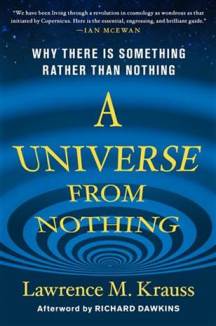“The universe is far stranger and far richer – more wondrously strange – than our meager human imaginations can anticipate,” says theoretical physicist Lawrence Krauss.
 The universe – where it came from and where it is going – have fascinated human minds for millennia. I often wonder what our distant ancestors would have felt when gazing upon the expanse of stars in the heavens with complete ignorance as to what they were witnessing.
The universe – where it came from and where it is going – have fascinated human minds for millennia. I often wonder what our distant ancestors would have felt when gazing upon the expanse of stars in the heavens with complete ignorance as to what they were witnessing.
So, as a not so ignorant mammal I sat inspired as I listened to Lawrence Krauss at the Auckland Readers and Writers Festival earlier this month discuss his book A Universe From Nothing (based on a YouTube video of the same title back in 2009).
No surprise that this book has generated a tonne of interest and the inevitable criticism. The book takes the reader on a quick journey through the history of modern cosmology arriving at the heavy yet comprehensible ideas of how a universe like the one we find ourselves in can begin, evolve and ultimately end. Could there be a bigger task to take on than the biggest question of them all – “why is there something rather than nothing?”
Enter science
Typically the domain of philosophy and theology, Krauss explains that mere musing about the origins of the universe are not enough anymore.
When Aquinas, Plato, Aristotle and others from history have sought to explain reality it has been from a position of ignorance with respect to modern physics and cosmology. Heck, less than 100 years ago we didn’t realise their galaxies other than our own Milky Way. We have learned a tremendous amount in the past century and Krauss says this should now inform our discussions on the universe, rather than seeking to recycle old, problematic philosophical arguments.
Supernatural answers thrive in times of ignorance, but as Krauss says, magical explanations should really come after we have thoroughly examined reality.
And reality is a strange beast. Multiple lines of evidence converge on the age of the universe is 13.72 billion years old; started in a big bang; is dominated by dark matter and dark energy; underwent inflation early on; is expanding at an accelerating rate and has a flat geometry. The latter fact has surfaced only in recent years, specifically from close investigation of the Cosmic Microwave Background.
What these findings tell us is that we live in a Zero energy universe. The “free lunch at the end of the universe” as Krauss calls it reveals that virtual particles can pop in and out of existence from empty space. A universe of “stuff” from nothing, even though we don’t know for certain if that is exactly what happened at the creation of our universe, makes a divine spark obsolete.
The same problems that exist for the created exist for the supposed creator (God)
When confronted with the problem of existence and where “stuff” comes from, our earliest attempts at understanding the unfathomable was to posit god/gods must be at work. Later, philosophers realised that inventing a first cause and labelling it God doesn’t get one out of the “something from nothing” quandary. If anything, this increases the problem we are trying to explain.
God is either something or nothing and if he is something then his existence needs explaining. If God is defined as nothing then the label is arbitrary. One apologetic response to this is to make God is an “immaterial substance” or “spirit” but this adds no new information and besides, “immaterial substance” is a contradiction.
Science keeps on forging ahead
How do we escape this fruitless hypothesizing about nature and actually gain some idea as to why/how the universe is the way it is?
“The universe turns out to be nature may be cleverer than philosophers and theologians” says Krauss. His book elaborates on the fact that science has done some real work in answering some of the mind-bending questions about our universe, how it started and how it will end.
Krauss says that our intuitive understanding of probabilities is always flawed because in reality everything is improbable. The only thing that would be miraculous is if nothing miraculous happened.
The universe is huge and very old and improbable things occur all the time, including life.
In bringing science to bear on what has traditionally been a safe, unfalsifiable, off-limits space for theologians and philosophers, Krauss has come under fire. The jabs at philosophers and theologians (they are “experts at nothing”) probably didn’t help, but to be fair I think his central point is true: “… This is why philosophy and theology are ultimately incapable of addressing by themselves the truly fundamental questions that perplex us about existence. Until we open our eyes and let nature call the shots, we are bound to wallow in myopia”.
In conclusion – Nothing is unstable
Why is there something rather than nothing? I think you should read the book for a full explanation. However, for the sake of a sound bite, Lawrence Krauss would say “nothing is unstable”. Empty space is bubbling with energy – particles and their anti-particles pop in and out of existence. Space itself can emerge from nothing.
Given this, we have good reason to think there may be a multiverse filled with universes of varying natural laws – some with life and some without. The universe is huge and old and anything we think is improbable (like life) is very probable given the immensity of time and space.
One thing is for sure, even the briefest peek into Pandora’s Box that is modern cosmology is enough to keep one amazed for a life time. Thanks Lawrence!

